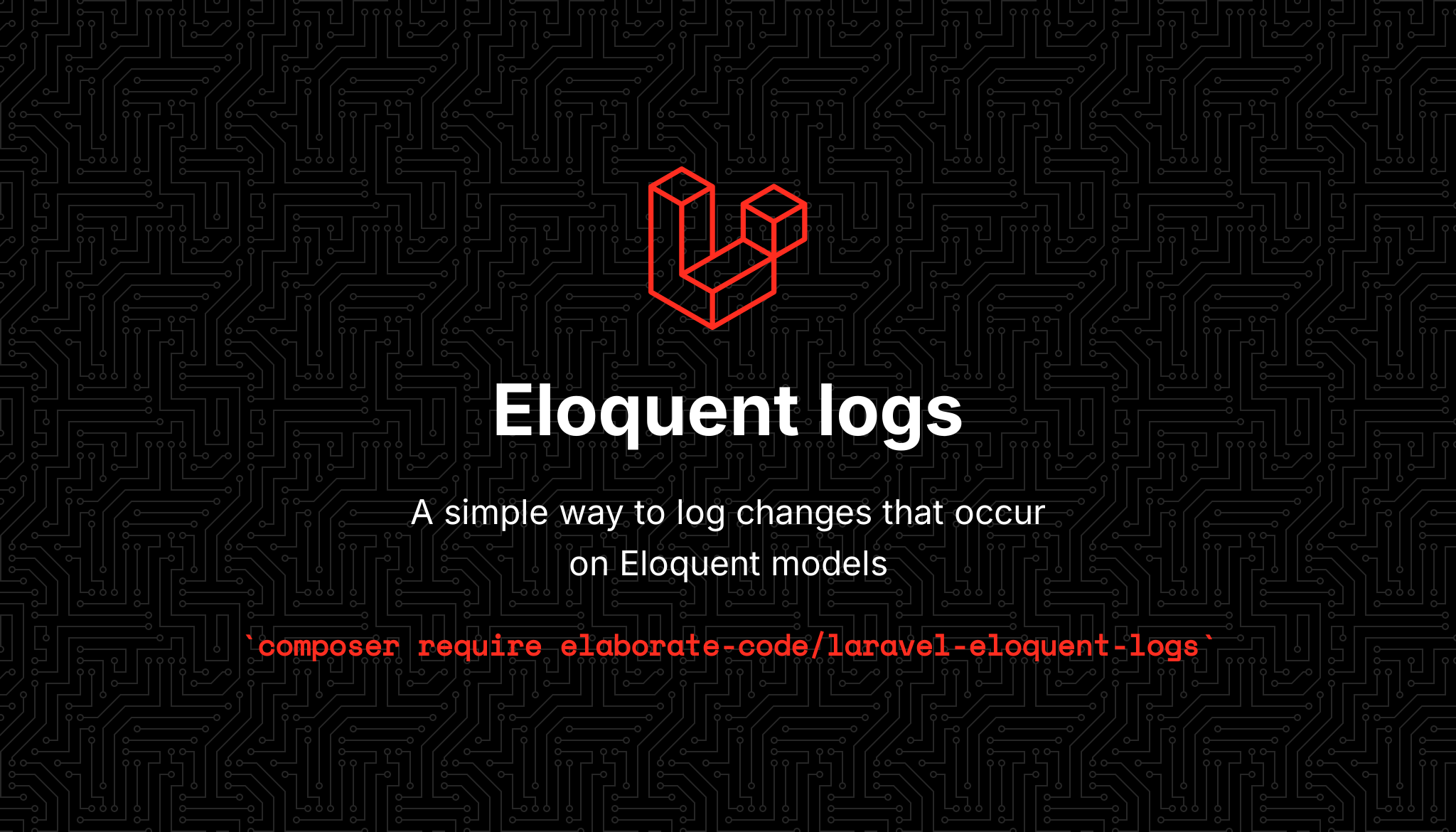Log what happens to your Eloquent models (created|updated|deleted|soft deleted|restored|force deleted) and keep and eye on who made the change, how and when.
This solution is simple to integrate and introduces minimal changes to your project: 1 migration, 1 model, 1 trait, and 1 facade.
Install the package via composer:
composer require elaborate-code/laravel-eloquent-logsPublish the migrations:
php artisan vendor:publish --tag="eloquent-logs-migrations"Run the migrations:
php artisan migrateYou can publish the config file with:
php artisan vendor:publish --tag="eloquent-logs-config"This is the contents of the published config file:
return [
'logs_model' => \ElaborateCode\EloquentLogs\Models\EloquentLog::class,
'logs_table' => 'eloquent_logs',
'user' => \App\Models\User::class,
];That allows you to rename the logs_table before running the migrations.
Pick an Eloquent model that you want to log the changes that happen to it and add the HasLogs trait to it.
namespace App\Models;
use Illuminate\Database\Eloquent\Model;
class ExampleModel extends Model
{
use \ElaborateCode\EloquentLogs\Concerns\HasLogs;
// ...
}After adding that trait, every change made to the model will be recorded.
Important warning from Laravel docs
When issuing a mass update or delete query via Eloquent, the
saved,updated,deleting, anddeletedmodel events will not be dispatched for the affected models. This is because the models are never actually retrieved when performing mass updates or deletes.
You can load a model's logs using the eloquentLogs relationship:
$example_model->eloquentLogs;
$example_model->load('eloquentLogs');
App\Models\ExampleModel::with('eloquentLogs')->find($id);And you can query logs directly:
// latest 5 logs with affected models
ElaborateCode\EloquentLogs\Models\EloquentLog::with('loggable')->latest()->limit(5)->get()By default each one model event will result in a query to log the action.
$example_model = ExampleModel::create(['name' => 'foo']);
$example_model->update(['name' => 'bar']);
$example_model->delete();
// ⚠️ This will result in 3 queries to insert the 3 events logs into the database You can improve the logging process by using the CacheEloquentLogQueries facade
use ElaborateCode\EloquentLogs\Facades\CacheEloquentLogQueries;
CacheEloquentLogQueries::start();
$example_model = ExampleModel::create(['name' => 'foo']);
$example_model->update(['name' => 'bar']);
$example_model->delete();
CacheEloquentLogQueries::execute();
// 👍 This will result in 1 query to insert the 3 events logs into the database The facade includes other methods that you wouldn't necessarily need to use:
// Stops caching and empties the cache without queries execution
CacheEloquentLogQueries::reset();
// Empties the cache but doesn't stop caching
CacheEloquentLogQueries::flushQueries();
// Stops caching until the reuse of start() and doesn't empty the cache
CacheEloquentLogQueries::suspend();
// Returns a boolean
CacheEloquentLogQueries::isCaching();You can specify the events to not log on the model instances by listing the events to ignore on YourModel::$loggableOptions['ignore'].
namespace App\Models;
use Illuminate\Database\Eloquent\Model;
class ExampleModel extends Model
{
use \ElaborateCode\EloquentLogs\Concerns\HasLogs;
public static array $loggableOptions = [
'ignore' => ['created', 'updated', 'deleted', 'softDeleted', 'forceDeleted', 'restored'],
];
// ...
}From seeders:
namespace Database\Seeders;
use Illuminate\Database\Console\Seeds\WithoutModelEvents;
use Illuminate\Database\Seeder;
class DatabaseSeeder extends Seeder
{
use WithoutModelEvents; // Add this trait
public function run(): void
{
// Silent eloquent queries ...
}
}Anywhere from your code:
\Illuminate\Database\Eloquent\Model::unsetEventDispatcher();
// Silent eloquent queries ...
\Illuminate\Database\Eloquent\Model::setEventDispatcher(app(Dispatcher::class));
// ...Explore the Eloquent docs for more options
Among the bajillion packages that Spatie has so graciously bestowed upon the community, you'll find the excellent laravel-Alternative package.
composer testPlease see CHANGELOG for more information on what has changed recently.
Please see CONTRIBUTING for details.
Please review our security policy on how to report security vulnerabilities.
The MIT License (MIT). Please see License File for more information.






